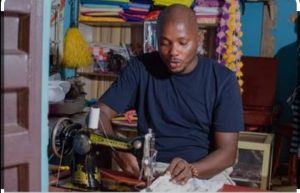By Mutalib Jibril
Juggling academics with entrepreneurship is no small feat, but some university students have mastered the art of balancing both. For many, financial independence is a key motivator, while others are driven by a desire to solve pressing problems in their communities. Through resourcefulness, discipline, and time management, they have been able to build thriving businesses without compromising their academic performance.

With Nigeria’s unemployment rate at 4.3% in second quarter of 2024, and youth-led startups topping the country’s business index, entrepreneurship has become a vital path to self-sufficiency. Small and Medium-sized Enterprises (SMEs) contribute 48% to the national GDP and account for 96% of businesses and 84% of employment. For students, venturing into business is not just about making money—it’s about securing a future in an unpredictable job market.
Nimattallahi Kpayero – The Shea Butter
Entrepreneur

Mohammad Nimattallahi Kpayero, a 400-level Law student at the University of Ilorin, ventured into the shea butter business, drawing inspiration from the abundance of high-quality shea nuts in Baruten, Kwara State. With an initial capital of ₦50,000 from her brother in 2019, she started small but gradually expanded her business to supply shea butter both nationwide and internationally.
“I realized that Kwara, especially Baruten and Kaiama, has one of the best qualities of shea butter, yet many people do not know about it. I decided to explore this opportunity and introduce the product to a larger market,” she said.
While balancing the rigorous demands of being a law student with running a business has been challenging, Nimattallahi has learned how to go about these difficulties. “Being a law student is already tedious, and combining studies with entrepreneurship has not been easy. However, as an entrepreneur, you must be ready to face and counter challenges,” she explained.
She attributes much of her success to social media, which she leverages for marketing. “I use Facebook, WhatsApp, and Instagram to reach my customers,” she added.

Beyond financial gains, Nimattallahi takes pride in the fact that she has been able to ease the financial burden on her parents. “Now, I rarely ask my parents for money. My business covers most of my expenses,” she said.
Her advice to aspiring student entrepreneurs is to Identify a business opportunity within their environments. Start small but remain consistent. And also social media to promote thier brand.
Daniel – The Problem Solver in the Hostel
Daniel, a student of the Department of Chemical Pathology, School of Medical Laboratory Science at Usmanu Danfodiyo University Sokoto, started his business as a barber in the hostel to meet two needs: solving personal financial challenges and addressing a common problem in his hostel.
“My inspiration came from two reasons: first, to solve some of my financial problems, and second, to provide a solution for students facing challenges in getting good hair cuts within the campus ,” he said.
Managing academics and entrepreneurship, he admits, is tough, but effective time management has helped him stay on track. “I make sure to use every minute wisely. Time is a very important resource, and if well managed, you can balance both,” he explained.
For Daniel, the journey has been rewarding. “I can now handle my personal expenses without relying heavily on my parents. That sense of independence is priceless,” he added.
His advice to students looking to venture into business while in school for students to look for a problem to solve; business is about providing solutions.
Learn everything you can about your chosen business.
Strive for excellence—be the best in what you do.
Don’t expect too much at the beginning; growth takes time. And most importantly, give priority to your studies.
Sodiq Ajisafe– Founder of Fastfil
Sodiq, a Pharmacy student at Usmanu Danfodiyo University Sokoto, founded Fastfil, a service that helps students refill their gas cylinders conveniently and affordably , and also allows students order foodstuffs, reading materials, cooking utensils online and so on.
His motivation came from two main factors: exploitation and personal experience.
“I hated seeing students being exploited with exorbitant transportation fees just to refill their gas cylinders. Also, some students don’t understand Hausa, so they tend to use it to exploit students in the market.
As a pharmacy student, my schedule is so tight that refilling my gas cylinder or buying foodstuff became a daunting task. Now, the task is a bit easier as a have employed people to run the business while I man their activities, he shared.”
“It’s fulfilling to know that my business is solving real problems for students while also sustaining me financially,” he said.

Despite his demanding academic workload, Sodiq has found ways to balance both responsibilities. “Discipline and proper time management have been my strategies. I plan my time effectively to ensure my business doesn’t affect my academics,” he added.
He further advise students who wants to navigate into entrepreneurship to identify a gap in your environment and find a way to fill it. “Start with what you have—don’t wait for the perfect moment.Learn how to manage your time effectively,” he ended
What Expert Thinks…
Speaking with the News Digest Press, Dr. Adebayo Kolawole, Business Administration Lecturer at Ekiti State University, believes entrepreneurship among students is commendable, as it enables financial independence and enhances essential skills like problem-solving and decision-making.
“Engaging in business while in school helps students develop leadership and financial management skills. These are qualities that will be useful beyond the university environment,” he noted.
However, he warns that students must maintain a balance. “Academics should not be neglected. If students fail in their studies, the essence of being in school is defeated,” he cautioned.
Dr. Aliyu Adamu a lecturer at the Taraba State University, supports student entrepreneurship and emphasizes experiential learning.
“Schools should integrate real-world business scenarios into their curriculum to encourage hands-on learning. Students should also be mentored and guided to ensure their businesses are sustainable,” he said.
He encouraged student entrepreneurs to seek mentorship and make use of available university resources. “Many universities offer business incubation programs, grants, and mentorship for students. They should take advantage of these opportunities,” he added.
This Story is supported by the National Association of Campus Journalists (NACJ), Usmanu Danfodiyo University, Sokoto.
